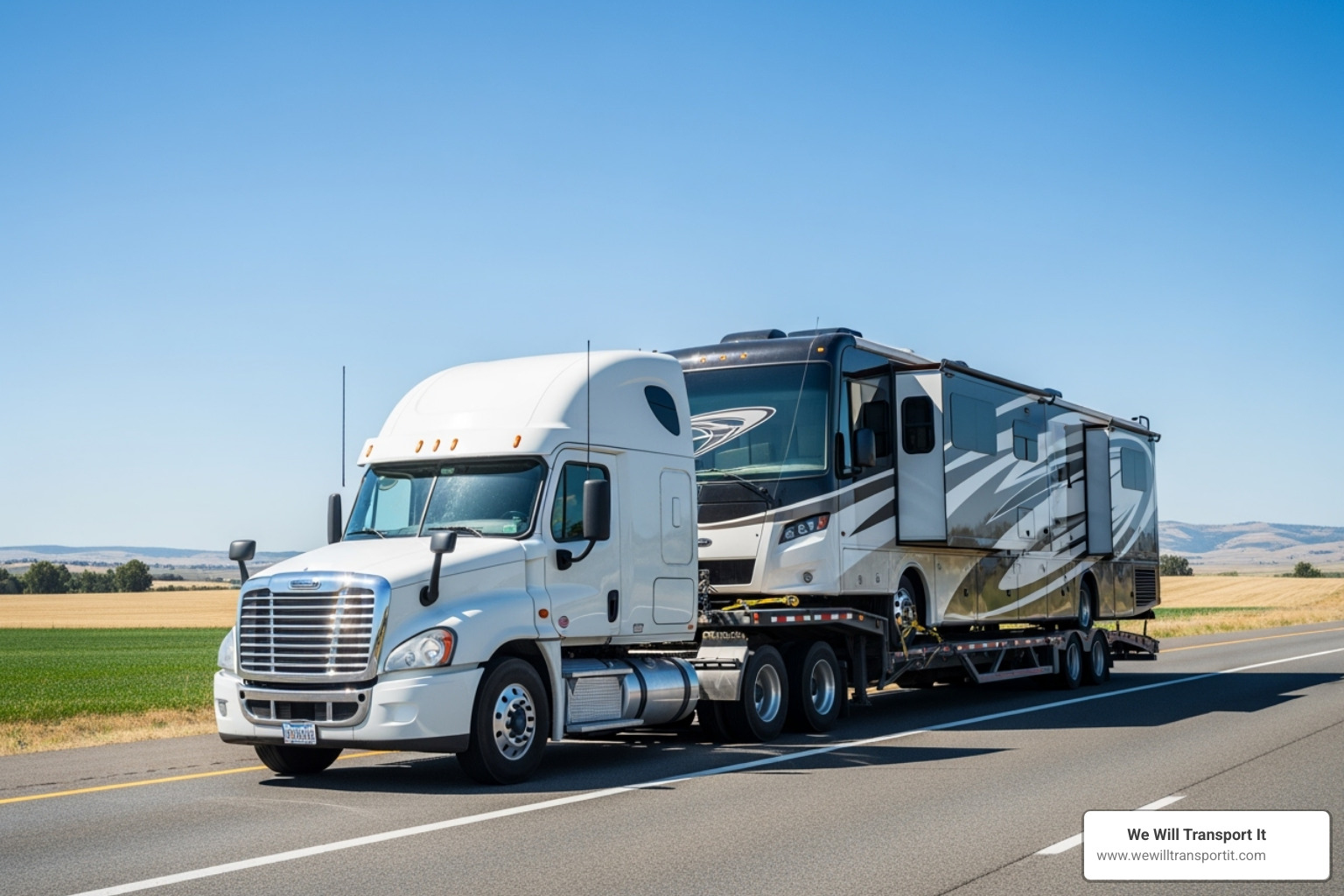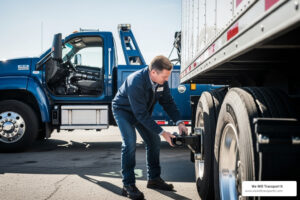Finding the Right RV Transport Company
When you need to move your recreational vehicle, choosing the right RV transport company is key. To find a reliable one, focus on these essential points:
- Check Credentials: Ensure the company is licensed, bonded, and insured. Ask for proof.
- Evaluate Service Types: Confirm they offer the specific transport method you need (e.g., tow-away, drive-away, flatbed).
- Review Experience: Look for companies with a long track record and positive customer feedback.
- Get Clear Quotes: Demand transparent pricing with no hidden fees.
Knowing these points is crucial. As William Meyer, I’ve spent over a decade coordinating thousands of vehicle and equipment transports. My experience has shown me the ins and outs of choosing a reliable RV transport company with confidence.

Key terms for rv transport company:
Understanding the Main Types of RV Transport Services
Moving your RV shouldn’t feel complicated. A professional RV transport company will match the right method to your budget, timeline, and the kind of rig you own.
- Tow-away – A heavy-duty pickup hitches to your trailer (travel trailer, fifth-wheel, toy hauler) and tows it straight to your new location. It’s simple, widely available, and usually the lowest cost for towables.
- Drive-away – A licensed driver gets behind the wheel of your motorized RV (Class A, B, or C) and drives it to the destination. You pay mainly for time and fuel, but your coach will collect normal mileage.
- Flatbed / lowboy hauling – Your RV rides on a specialized trailer, never touching the road. It costs more, but it’s the go-to choice for luxury coaches, inoperable units, or anyone wanting near-zero wear and tear.
- Power-only transport – A semi-tractor provides the “power” for very large trailers that have no self-propulsion, common in commercial moves or for oversized fifth-wheels.
| Service Type | Cost | Speed | Wear-and-Tear | Best Use Cases |
|---|---|---|---|---|
| Tow-Away | Moderate | Moderate | Moderate | Travel trailers, fifth-wheels |
| Drive-Away | Low | Moderate | High (on RV) | Operational Class A/B/C motorhomes |
| Flatbed | High | Moderate | Minimal | Luxury, inoperable, or oversized RVs |
What Types of RVs and Trailers Can Be Transported?

A reputable carrier can move almost anything on wheels:
- Class A, B, & C motorhomes (drive-away or flatbed)
- Fifth-wheel & gooseneck trailers (tow-away)
- Conventional travel trailers and pop-ups
- Toy haulers & expandable/utility trailers
- Tiny homes, horse, boat, or cargo trailers
Need service in Washington, Michigan, or anywhere in between? Nationwide networks make that possible.
Understanding the Different Types of RV Transport Company Services
Tow-away jobs use bumper-pull, gooseneck, or fifth-wheel hitches. Drive-away puts a pro behind your steering wheel. Flatbed moves rely on RGN, step-deck, or lowboy trailers that drop to ground level so large RVs can be winched or driven aboard. Each option exists so your RV can travel safely, legally, and on budget—whether you’re shipping across Illinois or across the country.
How to Choose a Reputable RV Transport Company
Your RV is a serious investment, so treat picking a transporter like hiring a co-pilot you can trust.
- Verify credentials – Any real RV transport company carries an active USDOT & MC number, is bonded, and shows proof of commercial insurance. A quick search on the FMCSA Safety site confirms status.
- Ask about insurance – Look for at least $100,000 cargo and $1 million liability. Higher-value rigs may warrant extra coverage.
- Read reviews – Years in business plus plenty of 5-star ratings signal know-how and consistency.
- Demand a transparent quote – Hidden fees and large, non-refundable deposits are red flags. Legit companies break down mileage, permits, and any extras in writing.
- Nationwide reach & permit handling – Oversized loads often need state-by-state paperwork and, occasionally, pilot cars. Seasoned transporters handle all of it so you don’t have to.

The Technology Edge
Modern carriers rely on driver mobile apps, real-time GPS tracking, and customer dashboards that let you watch the trip unfold from your phone. Round-the-clock support means updates are never more than a call—or click—away.
Red Flags: How to Spot and Avoid Untrustworthy Movers
When you’re ready to move your precious RV, you want everything to go smoothly. While most RV transport company services are fantastic, it’s wise to know that, just like in any industry, there are a few “bad actors” out there. Protecting your investment means being smart and recognizing the signs that something might be off. We want your RV transport experience to be stress-free, whether you’re looking for RV transport tips for West Virginia or anywhere across the country.
Warning Signs of a Bad Transporter
So, how can you spot a less-than-reputable mover? Here are the key red flags to watch out for:
First up, beware of unusually low quotes. If a price seems “too good to be true,” it probably is. These lowball offers often come from folks who cut corners. They might not have the right safety measures, permits, or even proper insurance. Always get several quotes and compare them. Sometimes, a lower price can be legitimate, like when a company uses “backload” opportunities (filling an empty truck on its return trip). But even then, make sure they are fully licensed and insured.
Another big warning sign is large upfront deposits or cash-only demands. Be really careful if a company asks for a big chunk of money upfront, especially if it’s a large percentage of the total cost. This can be a scam where the “transporter” takes your money and disappears. Reputable companies usually have fair payment terms. Often, you’ll pay a smaller, refundable deposit, or the main payment is due only when your RV is safely delivered.
Look out for a lack of a professional website or online presence. A trustworthy business will have a proper website. It should clearly show their contact information, details about their services, and their terms. If a company only advertises on social media or sites like Craigslist without a real business presence you can verify, that’s a big red flag. They might not be properly licensed or insured.
This next one is non-negotiable: no proof of insurance or licensing. If a company hesitates or can’t quickly provide their USDOT number, MC number, or proof of commercial insurance, walk away. These are basic requirements for them to operate legally and safely. Don’t risk your valuable RV with someone who can’t prove they’re legitimate.
Poor communication is another indicator. If you’re getting vague answers, unanswered calls, or just generally unprofessional communication even before you’ve booked, imagine how it will be during the actual transport! A good RV transport company will be clear and responsive from the start.
Always check online reviews. Look for negative online reviews, or even a complete lack of reviews for an established company. While a few negative comments are normal, a consistent pattern of complaints about damages, delays, or bad communication is a serious warning. On the flip side, if a company has been around for a while but has no reviews at all, that can also be suspicious.
Finally, be wary of high-pressure sales tactics. A professional RV transport company will give you time to think about your options and compare quotes. If someone is pushing you to book right away, it could be a sign of desperation or an unreliable service trying to rush you into a bad deal.
By staying vigilant and knowing these warning signs, you can protect your valuable RV and ensure a safe, reliable, and smooth transport experience.
Decoding RV Transport Costs: What Influences the Price?


Several ingredients go into every quote:
- Distance & route – More miles equal more fuel and drive time. Remote drop-offs can add surcharges.
- RV size & weight – Large Class A coaches need bigger trucks, heavier permits, and sometimes escort vehicles.
- Seasonality – Spring & summer are busiest; rates ease in late fall and winter.
- Transport method – Drive-away is usually cheapest, flatbed the most protective—and priciest.
- Fuel costs – Diesel prices change weekly; the U.S. Energy Information Administration tracks national averages.
- Extras – Expedited timing, storage, or upgraded insurance increase the bottom line.
Average RV Transport Rates Per Mile (ballpark)
- Travel trailer: $1.75 – $3.75
- Fifth-wheel: $2.25 – $4.00
- Class A motorhome: $4.50 – $6.50
Short hauls under 100 miles often cost more per mile because fixed pick-up expenses are spread over fewer miles, while cross-country trips benefit from volume pricing.
Your Pre-Transport Checklist: How to Prepare Your RV for a Safe Journey
A quick once-over now can prevent damage later. Use this streamlined checklist before the driver arrives:
Interior
- Remove all personal valuables and perishables.
- Latch cabinets, drawers, and doors; secure loose items with bungees or tape.
- Unplug electronics; switch off breakers and LP-gas.
- Drain fresh, gray, and black-water tanks.
Exterior
- Confirm tire pressure, tread, and lug-nut torque; test brakes and breakaway switch.
- Retract and lock slide-outs, awnings, antennas, and vents.
- Verify propane tanks are shut off (or removed if your transporter requires it).
- Eliminate hazardous materials (paint, fuel, ammo).
Final Steps
- Wash the RV so existing dings are visible, then photograph every side—time-stamped—for your records.
- Have exact length, width, height, and weight ready for the dispatcher.
- If the unit will be driven or towed, make sure it starts, runs, and lights function.
Following these steps ensures a smooth hand-off to your RV transport company and a damage-free delivery on the other end.
Frequently Asked Questions about Using an RV Transport Company
It’s completely normal to have questions when you’re thinking about moving your beloved RV. After all, it’s a big investment! That’s why we’ve gathered some of the most common questions we hear to help clear things up and give you total peace of mind. Whether you’re in Utah or anywhere else, our RV transport company is here to help guide you.
What kind of insurance coverage should I expect?
When you choose a professional RV transport company, you should absolutely expect robust insurance coverage. It’s vital for protecting your valuable RV during its journey. First, there’s Carrier Liability Insurance. This is what protects your RV if any damage happens due to the transporter’s fault. Most trustworthy carriers will offer at least $100,000 in cargo insurance for your RV, plus a hefty $1 million in general liability coverage. This is a standard in the industry and gives you a good baseline of protection.
Then, there’s Cargo Insurance, which focuses specifically on any physical damage that might happen to your RV while it’s being moved. For those particularly high-value RVs, you might even consider Supplemental Insurance Options. This extra coverage can come from your own personal RV insurance provider, or sometimes the transport company can recommend a third-party option. It’s like adding an extra layer of a cozy blanket for your RV!
Before you sign anything, always ask your chosen RV transport company for proof of their insurance. Take a moment to read through the terms carefully. Make sure you understand exactly what’s covered, what might not be, and any deductibles that could apply. It’s all about being informed and feeling secure.
Do transport companies handle permits for oversized RVs?
Oh, yes, absolutely! A truly professional RV transport company will handle all the permits and steer the complex world of regulations for oversized RVs. This isn’t a simple task, as the rules can change quite a bit from one state to another, and even within different local areas!
When an RV is bigger than the standard legal size – usually over 8.5 feet wide, 13.5 to 14 feet high, or beyond certain length limits – it’s considered an oversized load. This means that for every single state your RV travels through, specific State-by-State Permits are required. Getting these permits is a specialized job, and a reputable transporter will take care of all that paperwork for you.
For those extra-large or extra-wide RVs, state rules might even require Pilot Cars or Escort Vehicles. These are special cars that travel in front of and/or behind your RV, making sure other drivers know about the oversized load and helping everything move safely. The best RV transport company will have expert Logistics Management teams. They’re the pros at planning the route, getting all the right permits, and arranging those pilot cars. This way, your RV’s journey is always legal and, most importantly, safe.
Can you ship an RV to another state, like from South Dakota to Iowa?
Absolutely, you bet! Moving an RV from one state to another, like from South Dakota all the way to Iowa, is a main part of what nearly every professional RV transport company does. We specialize in interstate transport, which means we can handle cross-country shipping with ease.
Our nationwide service truly means we have the network, the skilled drivers, and all the right equipment to plan the logistics for almost any starting point and destination right here in the United States. And yes, that often includes trips to and from Canada and Mexico too! So, whether you’re making a big move or just relocating your RV for the season, you can relax knowing that professional RV transport services are ready to help, wherever you are.
Conclusion
Navigating RV transport might seem like a big puzzle at first. But now, with a clearer picture of the different services, what to look for in a great RV transport company, and how to get your RV ready, you’re well on your way to a smooth, stress-free move! We’ve talked about everything from tow-away, drive-away, and flatbed hauling methods, to what makes those price tags tick, and all those important steps to prepare your RV for its big trip.
The biggest takeaway? It all comes down to choosing wisely. Think of it like finding the perfect travel companion for your RV. Always put your trust in companies that are upfront about their pricing, have solid insurance coverage, a long history of happy customers, and truly understand how to handle all the tricky permits for those oversized RVs. Your recreational vehicle is a cherished part of your life, a significant investment – and it deserves to be in the hands of a reliable partner.
That’s exactly where We Will Transport It comes in. We pride ourselves on offering clear, transparent pricing, providing service across the entire nation, and having the know-how to handle even the most complex or heavy shipments. Our goal is simple: to make sure your RV transport experience is completely seamless, from the moment you call us to the moment your RV arrives safely at its new home.




